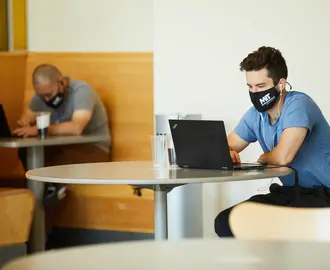As the executive director of an incubator that develops youth and adult programs at the National University of Singapore (NUS), Ye-Her Wu, SF ’14, has had a sweeping vantage point on how the pandemic has accelerated change for students, staff, and faculty. She has seen the overnight transformation of the contract between employer and employee, student and university, and faculty and university. Wu heads up SCALE-Global, an NUS team that is developing programs for higher education, continuing education, and workplace development. The goal: to prepare all members of the workforce, young and old, to thrive in a VUCA world. VUCA, for the uninitiated, is a management catch phrase for volatility, uncertainty, complexity, and ambiguity—or, as the authors of a Harvard Business Review article once defined it, “Hey, it’s crazy out there.”
Wu’s team has been managing at the forefront of that volatility since SCALE-Global was formed two years ago. In fact, SCALE’s reason for being is to prepare students for that volatility. When the pandemic hit, they were ready and able to ride those wild waves. Because they are a global team, they already worked remotely a great deal and were flexible in terms of hours because of late-night meetings with colleagues in other time zones. And they’ve been working on the creation and delivery of online programs for the past two years.
Expanding the tech comfort zone
When the pandemic hit, Wu saw, however, that not all members of the university community were receptive to the online format. Although NUS had in place a sophisticated digital learning unit that encouraged faculty to tap the latest online tools, faculty did not exhibit much interest in figuring out how to use this opportunity to teach differently. In the early days of the pandemic, Wu observed among the faculty a prevailing hope that things would soon revert to normal.
“The greatest challenge was getting faculty to teach differently,” Wu says. “A lot of them weren’t adapting because the change was thrust upon them so quickly. Our students cut them some slack at first, but that initial patience was gone by the new semester in August. Students, old and young, have learned to work with the remote format, and they expect teaching faculty to do more than just move their standard lectures online. Young students, in particular, are digitally savvy, and they are expecting faculty to make the most of the virtual environment.”
Wu says that in the first months of the pandemic, technical difficulties consumed much of the bandwidth in courses and programs. Instructors and students were exhausted by day’s end, so NUS staffed up with coaches to help solve technical problems and paired professors with young, tech-savvy teaching assistants. Most everyone is now up and running, she says. “Two or three months ago, we crossed the chasm. We’re on the other side of the technical problems, for the most part, and there’s no going back. Once people realized it was the new normal, they accepted—even embraced—remote classrooms and meetings.”
Wu believes the end result of the move towards remote teaching and work is actually a more humane workplace, a result of blurring the line between the personal and the professional. “I feel like we are beginning to let colleagues into our lives,” she notes. “When everyone is working from home, we get a glimpse of how they live—the children and pets in the background, the kids’ finger paintings on the wall. We get to say “Hi!” to a colleague’s 5-year-old and see him running around during virtual meetings. So when the mum has to take time off to bring him to the dentist or pick him up from school, the team will have a deeper level of empathy for the situation. The kid is no longer a theoretical issue. The team has put a human face to the challenge.”
Building better human beings
Wu adds that there is a downside to that human dimension, noting the disparity in environments. Students in particular, she says, get glimpses into their classmates’ lives through their surroundings—modest or lux—and those differences can underline an economic divide they might not have realized in the classroom.
All these aspects of the virtual environment are not lost on the thought leaders at NUS, Wu says. “We are learning that we need to educate citizens, not workers. In higher ed, we need to focus on turning out better human beings. We realize the importance of making the humanness of things a priority.”
Toward that end, NUS is looking at how it can increase interdisciplinarity in its education to help students better synthesize knowledge across diverse fields. One avenue is the formation of a new interdisciplinary college, the College of Humanities and Sciences. “We are recognizing that to prepare our graduates to be ready for a VUCA world,” Wu says, “we need to teach them to draw from multiple perspectives and to solve problems with interdisciplinary lenses.”



